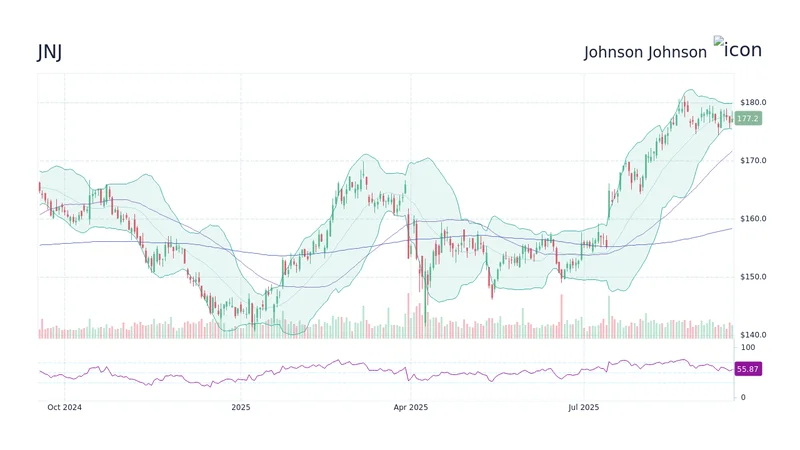So, Johnson & Johnson is cleaning out its garage.
You can almost smell the freshly printed press release, can't you? That specific aroma of corporate jargon and carefully managed expectations. J&J, the behemoth that lives in everyone’s medicine cabinet, just announced it’s kicking its orthopedics division, DePuy Synthes, out of the house. They're not calling it that, offcourse. They're calling it an "intent to separate" to "enhance strategic and operational focus," according to the official Johnson & Johnson Announces Intent to Separate Its Orthopaedics Business.
Give me a break.
This is the corporate equivalent of a couple saying they're "consciously uncoupling" when everyone knows they just can't stand the sight of each other anymore. Let's translate this from PR-speak into English. J&J looked at its massive, sprawling empire and decided the part that makes hip and knee replacements was dragging down the vibe. The orthopedics business is a $9.2 billion-a-year machine, but in the world of Big Pharma, if you're not a "higher-growth, higher-margin" rocket ship, you're dead weight.
This isn't about innovation. This is about appeasing the number-crunchers on Wall Street who get hives if a growth chart looks less like a hockey stick and more like a gentle, rolling hill.
The Great Unbundling Act
I've seen this play out a thousand times. A mega-corporation gets so bloated, so impossibly complex, that the only way to make the stock ticker happy is to start hacking off limbs. First, it was the consumer unit, Kenvue, which they spun off last year. Now, it's the bone-and-joint division. It’s like watching someone who spent 50 years hoarding finally decide to have a yard sale. They’re not getting rid of junk; they’re getting rid of perfectly good furniture that just doesn't match the new minimalist aesthetic their consultants recommended.
CEO Joaquin Duato claims this move lets J&J focus on being an "innovation powerhouse" in hot areas like Oncology and Immunology. A noble sentiment, I guess. But what does that really mean? It means they see bigger, faster profits in cancer drugs and complex biologics than they do in a titanium knee joint. The orthopedics market is a $50 billion slugfest, but it's a mature one. The real gold rush is in patented drugs that can cost a patient a fortune.

So, DePuy Synthes, the "largest, most comprehensive orthopaedics-focused company," will be cast out to fend for itself. J&J promises it will be "better positioned" as a standalone business. Better positioned for what, exactly? To get acquired by a private equity firm that will strip it for parts? To spend the next decade trying to prove to the market it's not the slow, boring business its own parent company just publicly declared it to be?
And what about the seven million patients they serve annually? Are their futures suddenly healthier because the company making their new hip is no longer attached to the one making Tylenol? I highly doubt it. This move has nothing to do with patients and everything to do with spreadsheets.
Bringing in the Spinoff Specialist
And just to make sure the message is crystal clear, look who they brought in to run the show: Namal Nawana.
This guy's resume reads like a "How to Prep a Business for Spinoff" manual. He was CEO of Smith & Nephew, a direct competitor. He was CEO of Alere until it got swallowed by Abbott. And, in the most delicious bit of corporate incest, he used to be a big shot at… you guessed it, DePuy Synthes, before he left J&J years ago.
This is a bad hire. No, "bad" doesn't cover it—this is a depressingly predictable hire. You don't bring in a guy like Nawana to nurture a long-term vision of orthopedic innovation. You bring him in because he knows how to package a company, slap a bow on it, and roll it out the door so it looks appealing to investors. He’s not a doctor or an engineer; he’s a transaction specialist. His job is to manage the "separation process," and I'm sure he'll do it beautifully.
While all this financial engineering is happening, let's not forget what J&J actually does. Just last week, the FDA slapped its highest-level "black box" warning on their cancer therapy Carvykti—a move that saw the Johnson & Johnson Stock (JNJ) Falters Ahead of Earnings Release as Cancer Therapy Gets Warning Label—because it might, you know, have a fatal impact on your gut. It's a stark reminder that while executives are sitting in boardrooms talking about "portfolio optimization" and "value creation," the actual business is a messy, high-stakes game of life and death. The idea that this spinoff will somehow magically "extend and improve patient lives" feels like an insult.
They're just shuffling deck chairs on the Titanic, and they want us to believe they're inventing a new kind of lifeboat. And maybe I'm the crazy one here, but I just don't buy it. This whole thing feels hollow, a ghost in the corporate machine making moves that only benefit other ghosts, and honestly...
Just Tidying Up for Wall Street
Let's be real. This isn't some grand, visionary strategy for the future of healthcare. This is corporate housekeeping. J&J is tidying up its balance sheet to make the numbers look cleaner for the next earnings call. They’re taking a profitable, stable, and essential business—one that literally helps people walk again—and treating it like an old couch they're putting on the curb. All so the main J&J stock can look sleeker and more focused on the high-margin drug game. It's a win for the shareholders and the executives. For everyone else? We're just supposed to applaud the efficiency of it all.
